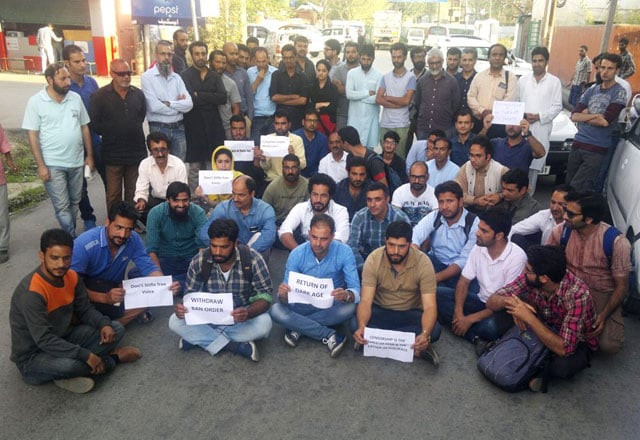Media ban in Indian Kashmir goes on record for the first time in recent history
Hilal Mir, Editor of Kashmir Reader, says the government did not seek any explanation before banning the newspaper

PHOTO: Vijdan Mohammad Kawoosa
An order signed by the District Magistrate, Srinagar, asked the publisher and printing presses to stop publishing the newspaper immediately. It said the newspaper “content tends to incite acts of violence and disturb public peace and tranquillity”.
Analysis: Kashmiris’ voice muzzled – both offline and online
Earlier on July 16, police seized printed copies of five leading newspapers in a nocturnal raid after which no newspaper was published for three days. The government disowned the gag though. Similarly, the government barred journalists from reaching their offices, disowned curfew-passes and banned mobile telephone and internet services, not only during the ongoing uprising but previously too. This time the state administration officially imposed the ban.
Hilal Mir, Editor of Kashmir Reader, says the government did not seek any explanation before banning the newspaper. “The order is based on an assumption. It says ‘[the content] tends to incite violence’, and cites no concrete reasons.” In an article, Mir writes, “Only this time the gag order comes with legal armour, apparently to frighten the rest of the local media into submission.”
Its Bureau Chief Moazum Mohammad says the newspaper has been reporting what other newspapers do. “We report what happens on ground; we don’t invent stories,” he says. “It is a warning shot for other newspapers as well.”
Naseer Ganai of the Delhi-based India Today group says Kashmir Reader does fair and objective reporting. “I think the government is taking on people who raised genuine voices and reported on what happened during all these years,” he says.
Leading newspaper Greater Kashmir in its front-page editorial terms the ban an arbitrary move. “Hardly ever have we faced such an all-out bid to curtail our freedom and capacity to operate,” it reads.
Pakistan and Kashmir inseparable, reiterates PM
Its Senior Editor Zahir-u-Din says Kashmir Reader has been different. “It was very bold, and now it is a bit diluted, but it still carries good stories and I think that is the reason (for the ban).” He says, other than directly imposing a ban on newspapers the government has been suppressing voices indirectly as well. “They are withholding [government] advertisements to break our determination.” He recalls the incident when the government stopped issuing advertisements to the newspaper he worked for only to make his daily column on human rights and disappearances die down. On the legal front, Zahir-u-Din says he was booked five times – for defamation, sedition and inciting violence – for his writings.
Journalists opine that the ban on Kashmir Reader is an attempt to put pressure on other publications to muzzle down. Ganai says, “By targeting one newspaper, the government has conveyed a message to all others that as long as you do not fall in line, you will have to bear the same consequences.” Zahir-u-Din says, “There may be other (newspapers) in the pipeline.” Faisul Yaseen, news editor at another leading newspaper Rising Kashmir, says the government wants to give an impression that “if they can go after big guns, they can go after any media person and slap the PSA (Public Safety Act) on them without citing any reason.”
Neyaz Elahi, editor of a Srinagar-based news agency, says the government spokesperson Naeem Akhtar initially had no information about the ban on Kashmir Reader. Although state administration ordered the ban, Zahir-u-Din says the actual control lay in the hands of police. “It is a police state; police decides whether you have a right to live or not. Others have no say and they allow it in the grab of so-called national interest, peace and order.”
Ground realities belie India’s claims: minister
Veteran journalist Yusuf Jameel writes in a Facebook post, “Imposing direct ban on the publication of a newspaper is unacceptable and unjustified in a democracy - functioning or supposed.” Ganai says he sees the ban as an act of ‘vengeance’. “On the one hand they (government officials) claim to be democratically elected representatives and they are going against a newspaper.”
Almost all other leading Srinagar-based newspapers have raised their voice against the ban. A meeting of the editors’ association reportedly decided to approach the government before approaching the court of law or resort to a large-scale protest. Moreover, over a hundred journalists staged a sit-in protest on September 3 against the ban.
The administration has cited certain sections of News Papers (Incitement of offences) Act and Press and Publication Act to support the ban. However, advocate Mian Qayoom, president of Jammu and Kashmir High Court Bar Association, says it is “very difficult” for the government to legally defend this action, because of the freedom of expression people have. “It is not only the Indian Constitution which gives us this right (freedom of expression), it is everywhere and is coupled with various covenants, declarations and resolutions of the United Nations.” Qayoom gives the example of a newspaper, Wadi Ki Awaz, which was banned in 90s and resumed publication after the ban was challenged in court.
Muzzling of the media in Kashmir does not go unnoticed. For instance, The New York Times, in an editorial, termed the three-day ban on newspapers in July as a measure “profoundly troubling in democratic India”. Similarly, Indian Journalists Union staged a protest in Delhi against the ‘clampdown’, terming it ‘illegal and unconstitutional’.
Vijdan Mohammad Kawoosa is a Kashmir-based journalist and founder/editor of news website jandknow.com. He tweets @vijdankawoosa





1725099588-0/BeFunky-(41)1725099588-0-208x130.webp)













COMMENTS
Comments are moderated and generally will be posted if they are on-topic and not abusive.
For more information, please see our Comments FAQ